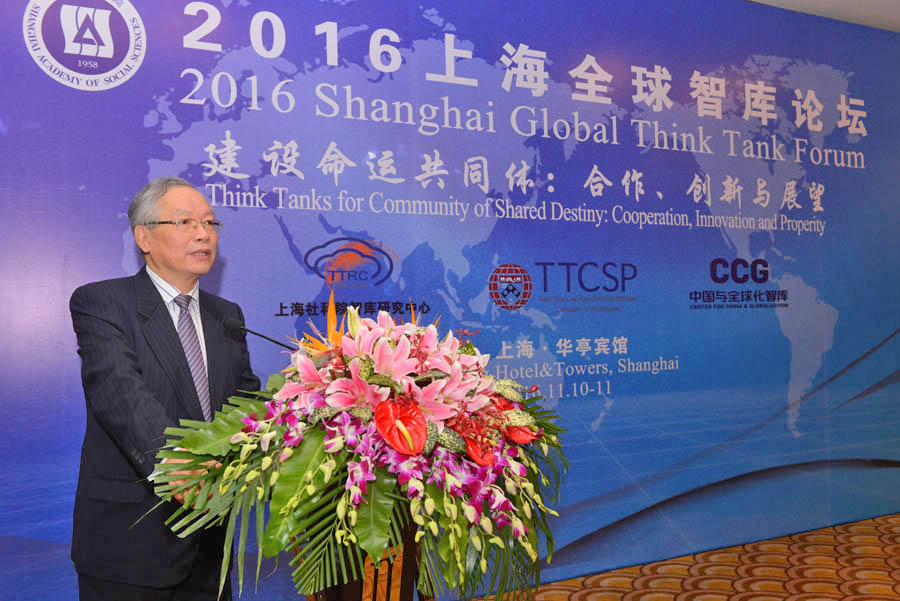China’s new think tanks will contribute to global agenda

Wang Zhan, president of Shanghai Academy of Social Sciences delivers a speech at the 2016 Shanghai Global Think Tank Forum held from Nov. 10 to 11 in Shanghai.
China is developing a new type of think tank with Chinese characteristics that will play a vital role in guiding policymaking, public service, as well as diplomacy, said Yan Shuang, deputy director-general of the Publicity Department of CPC Shanghai Municipal Committee at the 2016 Shanghai Global Think Tank Forum.
Organized by the Think Tank Research Center at the Shanghai Academy of Social Sciences (SASS) and the Think Tanks and Civil Society Program at the University of Pennsylvania from Nov. 10 to 11, the forum gathered scholars to discuss a wide range of topics, including the role of think tanks in global governance, think tank innovation, human resources and international exchange.
Emerging global challenges require global solutions, so global governance should be strengthened, and it is the right time to put systemic reform on the agenda, said Wang Zhan, president of SASS. He added that comprehensive and problem-oriented approaches to research should be equally emphasized.
Chen Dongxiao, president of the Shanghai Institutes for International Studies, said China’s new think tanks need to be more actively involved in China’s strategic planning and policy design so that they can contribute more to the global agenda.
For example, Chen said the Think 20 (T20), an official sub-forum of the G20 mechanism, has served as an “idea bank” by organizing a number of meetings since its launch in late 2015. T20 also released policy recommendations to the G20 on such topics as global economic governance, sustainable growth, innovation and structural reform, international finance, and trade and investment.
A large number of intersectional issues can be found in global governance, such as sustainable development, said Jiang Bo, vice-president of Tongji University. For example, water conservation not only requires researchers specialized in water reuse and infrared sensor technology but also experts on tax and law, he said.
Yu Jin, president of the China Region Development and Reform Institute, said as knowledge-intensive bodies, think tanks mainly conduct problem-oriented research and their intellectual output often goes beyond the scope of individual researchers. Think tanks require professionals who possess not only political wisdom and research capabilities but also the open and inclusive vision needed to cooperate with other researchers, he said.
Wang pointed out that global governance improves cooperation between different countries and enables them to reach consensus on development, as well as put the global think tanks in an interconnected network. China’s think tanks need to reach out and connect, boost their dissemination ability, actively join the dialogue and share experiences with other international think tanks to raise their global competitiveness and international influence, he added.
Chen Wenling, chief economist at the China Center for International Economic Exchanges, said cooperative systems and exchange platforms among think tanks should be established to pool their insights and gather their wisdom. In addition, think tanks need to improve their global vision and uphold the concept of a community of common destiny.
Lü Mengdi and Zha Jianguo are reporters at the Chinese Social Sciences Today.

 PRINT
PRINT CLOSE
CLOSE